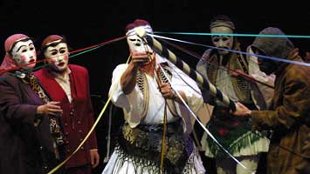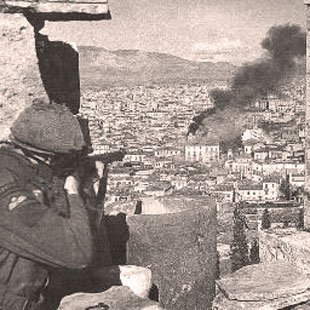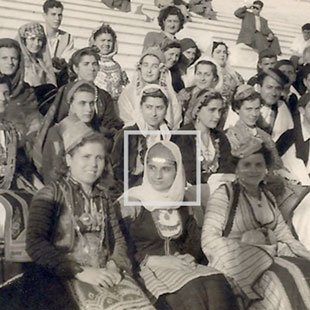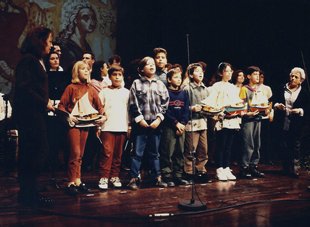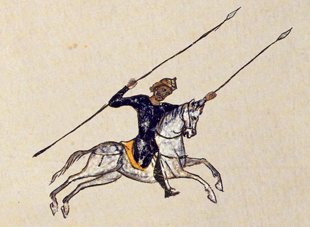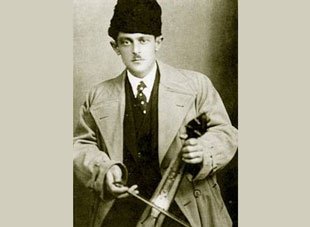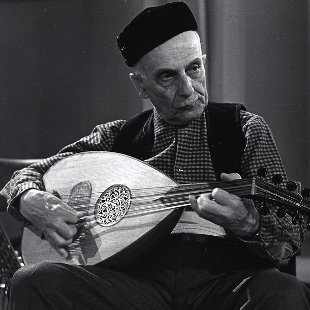You are at: Home page Her Work List of Songs Kalomoiris and the Saracen
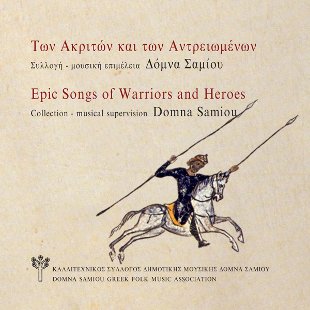
Kalomoiris and the Saracen

The Song of Armouris
Listen
Lyrics
Kalomoiris' youngest boy was born at night,
in the night before the cock crowed.
On the very same night that he was born, he asked for bread to eat,
and ate nine ovens full and nine gallons of milk,
and a deer and a fawn and the doe that bore it,
but still he cried and beat his fists, so little had he eaten.
He asked his mother why she was dressed in black.
- My son, they have your father chained up in a dungeon.
- Then give me your blessing, mother dear, and I shall go fetch him.
- But you're too young, my son, too young to go to fight.
See that room back there over yonder?
Your father's arms in there are kept, why don't you go and fetch them?
[They were in his hands before he took them up,
they were brandished before he swung them
and marching on their way before he girt themself.
Then he came to a black river and could not cross.
Planting his lance in the earth,
he gathered his weapons in his arms
and vaulted the river1 without so much as breaking a sweat.
And once he'd crossed over, crossed over to the other side,
he came face to face with a wild beast of a Saracen
with room for three mills a-milling across his shoulders
and room for three couples a-sleeping across his palms.
He stood there and considered how best to address him.
- If I call him Saracen, I fear he may kill me.
If I call him lord, I will bring shame upon myself.
So I’ll call him Saracen and what will be will be.
- Hail, Saracen. - Welcome, my son.
- Hey, Saracen, I've news for you,
Kalomoiris' youngest son has come to wage war on you.]
Translated by Michael Eleftheriou
1The hero uses a lance to help him get his heavy arms across to the other side, perhaps performing a kind of pole vault. The episode is easier to understand as it is related in the mediaeval ‘Song of Armouris’:
The Euphrates was powerful, it was swollen, too
it had high waves on it and it was overflowing.
He let out a piercing cry, as loud as he could.
‘I thank You God, who are good, I thank You a thousand times,
you gave me my bravery and Euphrates is taking it away from me’.
An angelic voice rang out from the heavens above.
‘Thrust your lance into the palm tree roots
and your clothes atop its end,
spur on your black steed to cross to the other side’.
(St. Alexiou, Βασίλειος Διγενής Ακρίτης και τα άσματα του Αρμούρη και του υιού τού Ανδρονίκου, Athens 2008, p. 164, v. 43-52).
Original Lyrics
Ο Καλομοίρης και ο Σαρακηνός
Tου Αρμούρη
Του Καλομοίρ' ο κα- τον Καλομοίρ' ο καλογιός,
του Καλομοίρ' ο καλογιός τη νύχταν εεννήθη,
ε, τη νύχτα πρι τον πε-, τη νύχτα πρι του πετεινού,
τη νύχτα πρι του πετεινού, πριχού πουλί να κράζει.
Τη νύχτα που εννήθηκε, ζητά ψωμί να φάει
και τρω' εννιά φουρνιές ψωμί κι εννιά ισίκλες1 βάλα2
και λάφι και λαφόπουλο και τ' αλαφιού τη μάνα
και πάλ' ήκλαιε κι εέρετο3 πως είχε λίο γιόμα.
Τη μάναν του νερώτηξε γιατί φορεί τα μαύρα.
- Υιέ μου, τον αφέντη σου στη φυλακή τον έχου.
- Ευκήσου μου, μανούλα μου, να πα να τονε φέρω.
- Υιέ μου, 'σου μικρόν παιί, για πόλεμο εν είσαι.
Θωρείς την πέρα κάμαρα, την πέρα καμαρίτσα;
Είτ' του κυρού σου τ' άρματα κι έπηε να τα πάρεις.
[Πρίχου τα πιάσει πιάνουτο, πριχού τα σείσει σειούτο,
πρίχου τα άλει4 πάνου του εκείνα πορπατειούτο5.
Αμ' έχει μαύρο ποταμό κι εν ημπόρ' α περάσει.
Ρίχτει κοντάριν εις τη γη και τ' άρματά του λάμνει6,
τον ποταμόν εγιάηκε7 χωρίς καμό και λάβρα.
Κι απείτι8 πέρα πέρασε κι απείτι πέρα γιάη,
Σαρακηνός του πάντηξεν αμέρωτο θερίο,
απάνω στις κουτάλες9 του τρ' ανεμομύλια 'λέθα,
απάνω στις βακτύλους του τρ' ανδρόυνα κοιμούτο.
Στέκει και διαλοΐζεται πώς να τον χαιρετήσει.
- Να τον ειπώ Σαρακηνό, φοούμαι μη με φάει,
να τον ειπώ αφέντη μου, πάλι ντροπή μού πέφτει.
Ας τον ειπώ Σαρακηνό κι ό,τι κλουθήξ' ας έρτει.
- Ώρα καλή, Σαρακηνέ. - Καλώς τον, τον υιό μου.
- Άμε, μωρέ Σαρακηνέ, να πάρεις το χαπάρι,
του Καλομοίρ' ο μικρογιός πόλεμο θα σου κάμει.]
1ισίκλα: δοχείο μέτρησης υγρών
2βάλα: γάλα
3εέρετο: έκλαιγε και χτυπιόταν
4άλει: βάλει
5πορπατειούττο: περπατούσαν
6Ο ήρωας χρησιμοποιεί ένα κοντάρι βοηθητικά για να περάσει στην απέναντι όχθη τον βαρύ του οπλισμό, ίσως δηλαδή κάνει ένα είδος άλματος επί κοντώ. Το επεισόδιο γίνεται πιο κατανοητό όπως περιγράφεται στο μεσαιωνικό «Άσμα του Αρμούρη»:
Ήτον ο Αφράτης δυνατός, ήτον και βουρκωμένος
είχεν και κύματα βαρεά, ήτον και αποχυμένος.
Στριγγέαν φωνίτσαν έσυρεν, όσην κι αν εδυνέτον
Ευχαριστώ σε Θεέ καλέ και μυριοευχαριστώ σε,
εσύ μ’ έδωκες την ανδρειάν και Αφράτης με την παίρνει.
Αγγελική φωνή του ήλθ’ εξ ουρανού απάνω.
Μπήξε το κονταράκιν σου στης φοινικέας την ρίζαν
και μπήξε και τα ρούχα σου ομπρός στο μπροστοκούρβιν,
κέντησε και τον μαύρον σου για να περάσεις πέρα.
(Στ. Αλεξίου, Βασίλειος Διγενής Ακρίτης και τα άσματα του Αρμούρη και του υιού τού Ανδρονίκου, Αθήνα 2008, σ.164, στίχ. 43-52).
7εγιάηκε: εδιάβηκε
8απείτι: αφού
9κουτάλες: ωμοπλάτες
Information
- Region: Dodecanese
- Area: Karpathos, Olympos
- Categories: Acritic Song
- Rhythm: 2 beats
- Dance style: Local dance
- Duration: 04:43
Collaborators
- Singer: Kostas Antimissiaris
- Tsambouna: Yannis Tsambanakis
- Dodecanesian lyra: Nikos Nikolaou
- Lute: Kostas Protopapas
Albums
Notes
The additional lyrics were taken from M.G. Michailidis Nouaros, Δημοτικά τραγούδια Καρπάθου, Athens 1928, p. 57.
The Byzantine epic ‘Song of Armouris’ is the oldest folk song to have entered the written tradition, and is known to us from a 15th-century St. Petersburg manuscript in a variation of 201 verses. Orally, it has survived in abbreviated versions, which are still sung on Cyprus and Karpathos, where Armouris has become Kalomoiris.
The plot of the written song goes like this: Armouris has been a Saracen prisoner for 12 years. Having proven his manhood on several occasions, Armouris' adolescent son gets his mother's permission to mount his father's tethered steed and, armed with his weapons, to cross the perilous Euphrates and enter into hostile territory where he crushes the Arab hordes. The Emir of Syria has no choice but to release Armouris, telling him that he wants his courageous son to wed his daughter.
Various opinions have been expressed as to the historicity of the characters and events echoed in the song. Older academics linked the name of the captive Armouris to Amorio, a city razed to the ground by the Arabs in 838, interpreting the song as referring to the victorious campaign beyond the Euphrates, waged in revenge by the Byzantines in 859.
Whatever the truth of the matter, the historical context of the song - one of very few which academia deigns to label ‘akritic’ - are clearly the clashes between the Byzantine empire and the Arabs. The vitality with which this reality is rendered had numerous researchers posit that the song of Armouris - in which the war between Byzantines and Arabs is the present reality, and peace (in the form of the marriage proposed at the end of the song) no more than a vision - predates the Epic of Digenis Akritis in which the two peoples are reconciled and live together in peace1.
Still, the song's interest is not restricted to its historical echoes and their interpretation; its poetic formulas and the nexus of symbols and myths woven around the hero could well mark it out as an archetypal source of inspiration for a number of other narrative heroic songs that have come down to us from the Byzantine period2. Miranda Terzopoulou (2017)
1St. Alexiou, Βασίλειος Διγενής Ακρίτης και τα άσματα του Αρμούρη και του υιού τού Ανδρονίκου, Athens 2008,, p. 161.
2G. Saunier, Ελληνικά Δημοτικά Τραγούδια. Συναγωγή μελετών, G. Andreiomenos (ed.), I. Botouropoulou (trans.), Athens 2001, p. 246.
Local dance known as ‘pano choros’.
Recording information
Studio recording, 2004.
Member Comments
Post a comment
See also
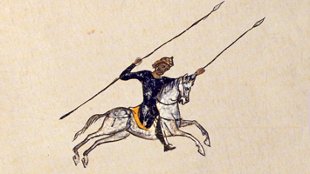
Song
Andronikos and the Princess

Song
Andrónikos and His Black Steed

Song
Feasting Lords Eating and Drinking
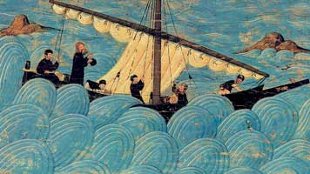
Song
A Sailor-Lads A-Dying
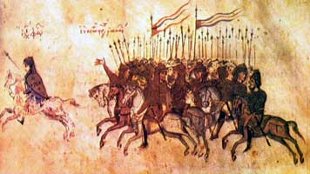
Song
I Saw Some Black Smoke

Song
Shes a Girl From Amorgos
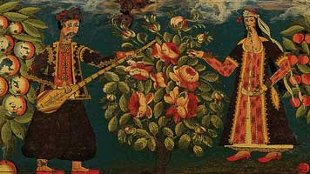
Song
The Apple Trees Complaint

Song
The Eagle and the Partridge

Song
The Four Palikari
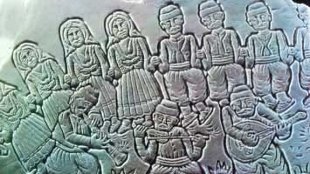

Song
Yannaros Expired (Explicit)
